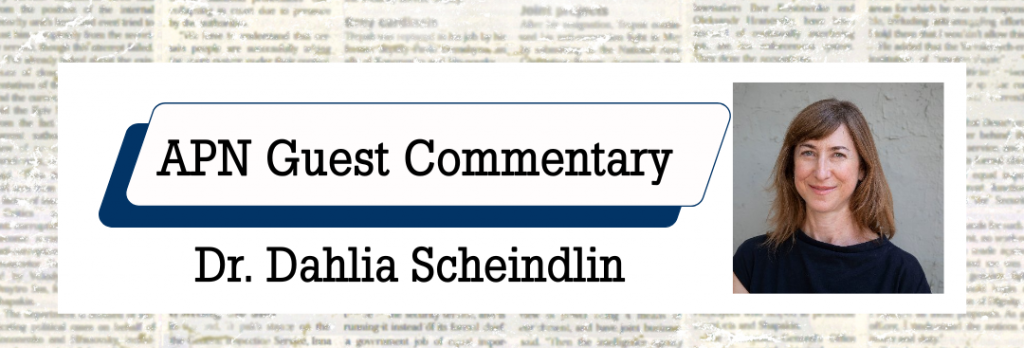
Dr. Dahlia Scheindlin, a scholar and writer,
is an international political and strategic consultant. She has advised and conducted research on nine national
campaigns in Israel over the past twenty years, and has provided research and advising for elections, referendums,
and civil society campaigns in fifteen different countries. She is the author of The Crooked Timber of Democracy in
Israel.
After nearly seven months of war with Hamas, fresh polls show that Israelis are deeply demoralized about the military campaign. They are skeptical that its aims can be achieved, desperate for hostage release, and have little faith in their leaders.
Yet there are contradictions in this picture. In recent weeks, surveys also show a slight rise for Likud when people are asked about electoral choice, and the thuggish ultra-nationalist parties of Betzalel Smotrich and Itamar Ben Gvir are trending slightly upwards. Likud is still far from the public’s top choice, and the original coalition does not yet win back its majority in surveys today, but the slow upward trend is real.
These conflicting trends could reflect erratic emotions, and competing desires for hard-line policies alongside agony over the hostages, as well as frustration that Israel seems stuck in an unwinnable war.
The most striking survey regarding the war was commissioned by Kan, Israel’s public broadcaster, and published on Tuesday, 30 April. This poll of 600 adult Israelis (Jewish and Arab citizens) found that the largest segment of respondents, 47 percent, were prepared to stop the war completely in return for return of all the hostages, even when the terms would include the “release of thousands of terrorists,” as per the poll question, referring to Palestinians held in Israeli jails. While nearly half support such a deal, significantly fewer people opposed it – just under one-third (32 percent). Another one-fifth (21 percent) said they didn’t know. It’s not hard to understand why many would find it tough to make such a call, but most likely these people would accept the quid pro quo if the decision were made for them by leaders. That’s actually why people elect leaders.
Kan’s survey comes against the backdrop of yet another round of talks for a hostage release deal that remains elusive after numerous attempts. It’s hard to capture how excruciating it is for Israelis each time: the clamor for updates about negotiations, the speculation and scramble for crumbs of information about the terms of each draft deal, the effort to divine Israel’s official position, and the bitter wait for Hamas’ response, followed by crushing disappointment each time; then the human instinct to rage, fury, and desire to apportion blame.
Citizens feel helpless; the protests demanding hostage release are fervent but remain limited in size. For months I have been trying to reconcile the fact that life in Israel looks increasingly normal, at least in the main cities in the center of the country where rocket fire has ceased for some months – and especially in the putative bon vivant metropolis Tel Aviv. Is it a chimera, and how brittle are people’s emotions behind the beach strolling and coffee sipping?
Kan’s survey from 30 April offers more insight. 65 percent of Israelis, nearly two-thirds, believe Netanyahu is full of it when he says Israel is a step away from victory. In truth, this is editorializing: the poll just asked whether Israelis believe or don’t believe him: only 17 percent believe him and 18 percent simply don’t know. But how would you know what to believe? From the start, Netanyahu has been spewing the “total victory” line; intoning like Jack Nicholson in The Shining that “only harsh military pressure will win hostage release.” But it’s the Israeli public that’s going mad: nearly seven months of war, hundreds of families have lost more sons, Hamas’ demands increase ever higher, and not only have the hostages not returned, they are suffering and dying.
Perhaps that’s why a stunning 85 percent of Israelis in a poll commissioned by Yediot Ahronot over Passover said they either don’t trust the government, or just trust it minimally (an absolute majority, 54 percent, said they don’t trust the government at all). Even two-thirds of Israelis who voted for the coalition parties in the last election said they don’t trust the government (minimally or not at all), according to the survey.
All of these things are true. At the Jaffa port over Passover, two guys gave a free public singalong show under a little white tent – one played an amplified acoustic guitar and the other played drums. This stripped-down duo sang beloved Hebrew songs and young parents danced with their toddlers at the water’s edge; was it forced cheer or was it real? An outside observer might be forgiven for thinking Israelis are callous. But when I bantered with a shop clerk not long ago, and asked how she thought things are going these days in the most open-ended, general way, she began to cry.
I believe Israeli society is angry and anguished; yet failures of imagination or a dearth of leadership in political life have led them to support Netanyahu over years of political inertia. For some, Netanyahu and his middling competitors are the best this country can do, and for others, the only alternative is the politics of hate, driven by religious fanatics. Young leaders voicing alternative visions for the future arise cyclically but often slink away after a few electoral cycles, politically and spiritually battered. Where are the rising stars of the 2011 social protest now? Israel’s “centrist” politics might be the best hope at present for a change; but the country needs a radical overhaul.